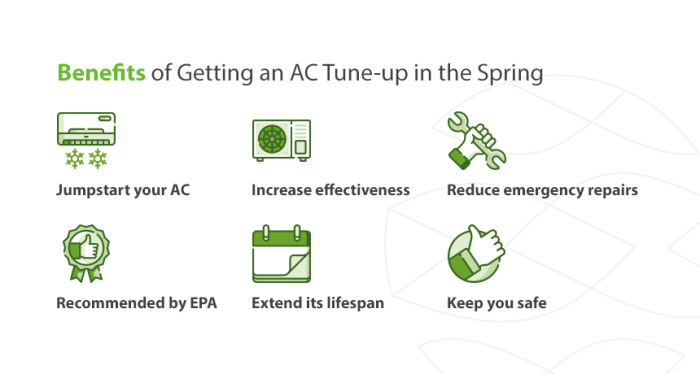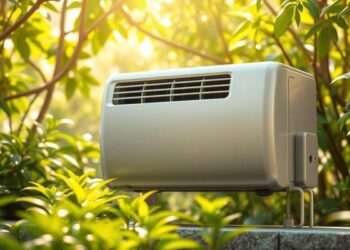Exploring the impact of regular AC maintenance on your electricity bill, this guide delves into the key components of an AC tune-up and the energy efficiency benefits it offers. Stay tuned to uncover how simple adjustments can lead to long-term cost savings.
Why Regular AC Maintenance is Important
Regular AC maintenance is crucial for ensuring the efficient and smooth operation of your air conditioning system. By scheduling routine tune-ups, you can optimize the performance of your AC unit, ultimately leading to lower electricity bills and a more comfortable indoor environment.Neglecting maintenance can result in various issues that can significantly impact your electricity bills.
A dirty air filter, for example, can restrict airflow, causing your AC system to work harder to cool your home. This increased workload not only consumes more energy but also puts unnecessary strain on the components of your AC unit, leading to potential breakdowns and costly repairs.One of the key benefits of an AC tune-up is that it can help identify and address minor issues before they escalate into major problems.
By having a professional HVAC technician inspect and tune up your air conditioner regularly, you can ensure that any potential issues are addressed promptly, preventing the need for expensive repairs down the line.
Components of an AC Tune-Up
Regular maintenance of your AC unit is essential to ensure optimal performance and energy efficiency. An AC tune-up involves checking various components to keep your system running smoothly and help lower your electricity bill.
Importance of Cleaning or Replacing Air Filters
Air filters play a crucial role in maintaining good indoor air quality and efficient operation of your AC system. Over time, air filters can get clogged with dust, dirt, and other particles, restricting airflow and causing your AC to work harder than necessary.
By cleaning or replacing air filters during a tune-up, you can improve airflow, reduce strain on the system, and lower energy consumption.
Checking Refrigerant Levels for Improved AC Efficiency
Refrigerant is the substance responsible for cooling the air in your AC unit. Low refrigerant levels can lead to decreased cooling capacity, increased energy consumption, and potential damage to the compressor. During an AC tune-up, technicians will check the refrigerant levels and recharge if necessary to ensure optimal efficiency and performance.
By maintaining proper refrigerant levels, you can help your AC system operate more efficiently, resulting in lower energy bills.
Energy Efficiency Benefits
Maintaining your AC system in top condition not only ensures a comfortable indoor environment but also helps in reducing your electricity bill significantly. By keeping your AC unit well-tuned, you can optimize its performance and minimize energy consumption.
Optimizing Performance through AC Tune-Up
- Regular maintenance, such as cleaning or replacing air filters, can improve airflow and reduce the workload on the system, leading to lower energy usage.
- Checking and adjusting refrigerant levels during a tune-up ensures that the AC operates efficiently, avoiding unnecessary strain on the system that can result in higher energy consumption.
- Inspecting and calibrating the thermostat can help in maintaining the desired temperature accurately, preventing the AC from overworking and wasting energy.
Examples of Energy Savings from Minor Adjustments
- Simple tasks like sealing duct leaks or insulating ductwork can prevent air loss and improve efficiency, reducing the amount of energy needed to cool your space.
- Cleaning the evaporator and condenser coils can enhance heat transfer, allowing the AC to cool your home faster and consume less energy in the process.
- Regular tune-ups can identify and address minor issues promptly, preventing them from escalating into major problems that could lead to higher energy consumption and costly repairs.
Long-Term Cost Savings

Regular AC tune-ups can lead to significant long-term cost savings for homeowners. By investing in maintenance services, you can ensure that your air conditioning system operates efficiently, which in turn can help lower your electricity bills and reduce the overall energy consumption of your home.
Lower Electricity Bills
- Regular AC tune-ups help keep your system running smoothly, preventing it from overworking and consuming excess energy.
- Well-maintained AC units are more energy-efficient, leading to lower electricity bills each month.
- By addressing any issues early on through tune-ups, you can avoid costly repairs that may arise from neglecting maintenance.
Cost-Effective Investment
- While there is a cost associated with scheduling regular AC tune-ups, the savings in energy bills over time can outweigh this initial investment.
- By maintaining your AC system properly, you can extend its lifespan and delay the need for expensive repairs or replacements.
- Long-term cost savings from regular tune-ups can provide peace of mind knowing that your system is operating efficiently and cost-effectively.
Conclusive Thoughts
In conclusion, optimizing your AC system through regular tune-ups not only reduces your electricity bill but also prevents costly repairs in the future. By investing in maintenance now, you are setting yourself up for significant savings down the road.
FAQs
How often should I get an AC tune-up?
It's recommended to get an AC tune-up at least once a year to ensure optimal performance.
Can I clean or replace air filters myself?
While it's possible, it's best to have a professional handle this during a tune-up for thorough cleaning and maintenance.
Will tuning up my AC system really lower my electricity bill?
Yes, a well-maintained AC system operates more efficiently, resulting in lower electricity consumption and reduced bills.




![How To Avoid Contractor Scams [Infographic]](https://airconditioner.infotangerang.id/wp-content/uploads/2025/10/how-to-avoid-contractor-scams-feat-120x86.png)








